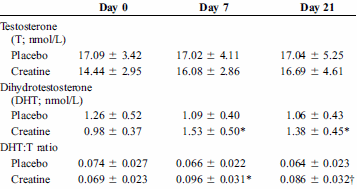Creatine [structural formula shown below] may work through an additional mechanism and not just by increasing the amount of energy-generating phosphate groups in the muscles. According to sports scientists at Stellenbosch University, South Africa, creatine increases the amount of the androgenic testosterone metabolite DHT [structural formula also shown below] in the muscles. The researchers report this in the Clinical Journal of Sport Medicine.

In their article the South Africans describe an experiment they did with twenty rugby players, average age 19. Half of them took a placebo for three weeks. The other half were given creatine and glucose. The function of the glucose was to improve the uptake of creatine in the muscle cells.
The test subjects in the experimental group took a daily dose of 25 g creatine and 25 g glucose for the first week. In weeks 2 and 3 they took a daily 5 g creatine and 25 g glucose.
The bodies of the test subjects in the experimental group reacted to the creatine in the way you’d expect the bodies of serious athletes for whom weight training is not the core fitness activity to react. Their lean body mass increased slightly and their fat percentage decreased by a miniscule amount.

Nothing new so far. But when the researchers did a blood analysis of the hormone levels in the players, they made a discovery. At the end of the first week, during which the rugby players had taken 25 g of creatine a day, their DHT level had risen by 56 percent. In the following weeks, when they took a lower creatine dose, the subjects’ DHT level went down, but remained raised.

"This effect was a large increase in DHT rather than a marginal and possibly physiologically insignificant effect", write the South Africans.
The testosterone concentration in the test subjects’ blood remained constant. You’d expect the test subjects would also have produced less estradiol, but the South Africans don’t mention estradiol at all in their article.
The researchers suspect that a creatine supplement increases the activity of the enzyme 5-alpha-reductase somewhere in the body. This enzyme converts testosterone into DHT, but exactly where this takes place the researchers don’t know. Not in the muscles is all they can say for sure, as the muscles don’t contain much 5-alpha-reductase.
Nor are the researchers sure whether the athletes build up more muscle fibre as a result of the metabolic change. This could be the case, they speculate. "Biochemical studies of androgen receptor affinity indicate that DHT is 4 times more biologically potent than testosterone", they write. The build up of muscle in creatine users, so often reported by sports scientists, may be partly due to endocrinal changes.
The scientists believe that their discovery is important for athletes. They warn of the potential side-effects of creatine, and argue that more research should be done on whether creatine increases the risk of baldness and benign enlargement of the prostate.
Source:
Clin J Sport Med. 2009 Sep;19(5):399-404.

